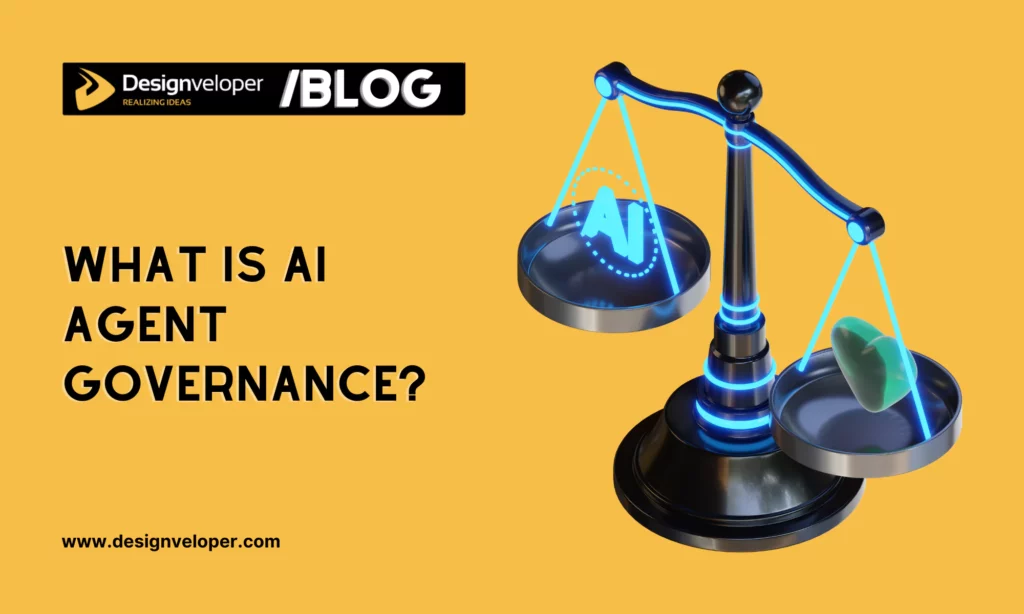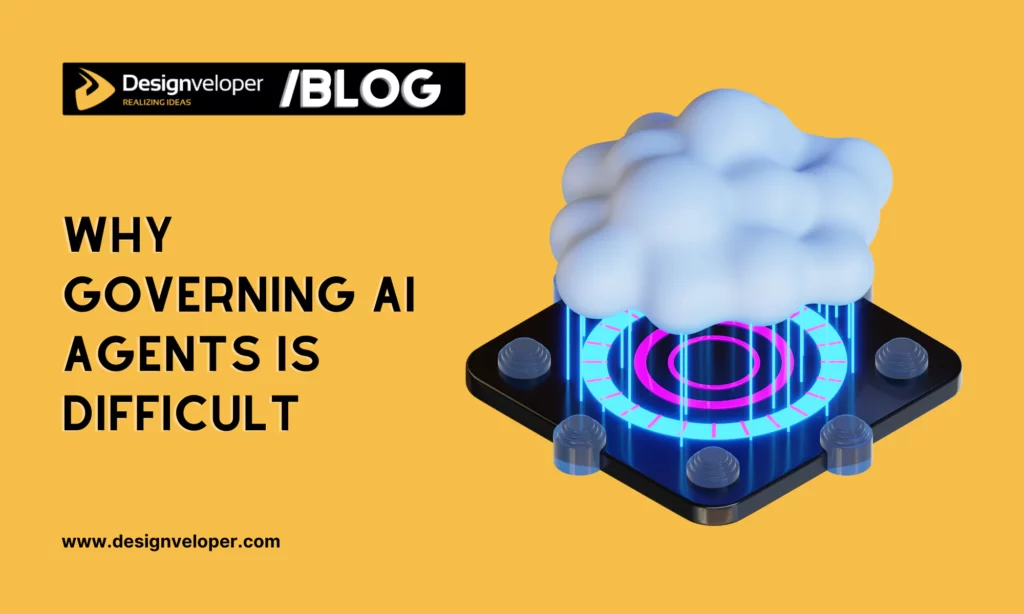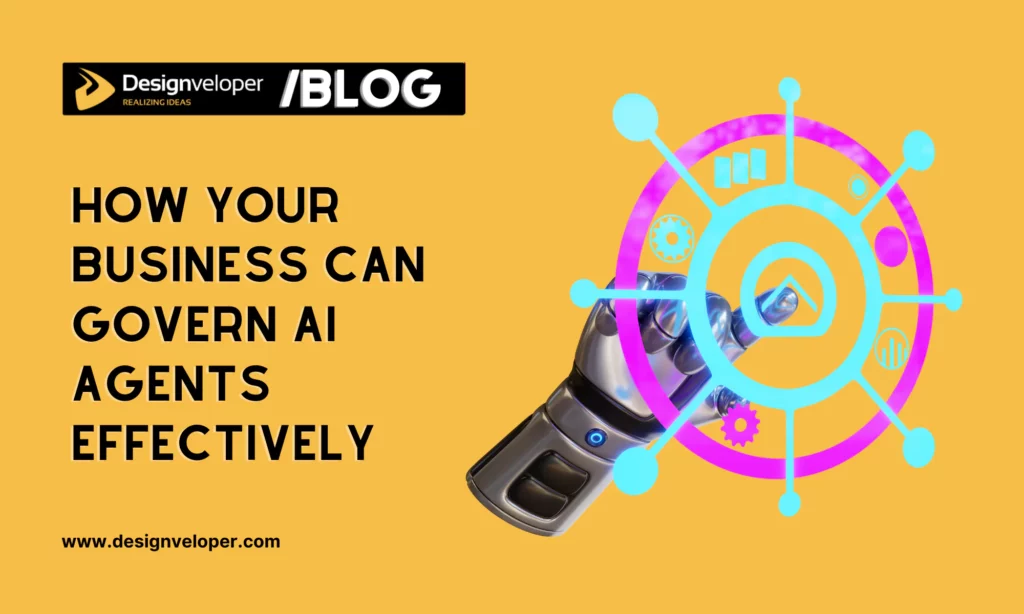AI agents are becoming the hot keyword these days. Despite still staying in the infancy stage, these agents are capable of autonomously thinking, planning, and acting on specific tasks, often with minimal human oversight. While agentic AI opens new opportunities for businesses to improve operational efficiency and reduce costs, many people still feel worried about controlling these agents to ensure they work responsibly and ethically. This is where AI agent governance comes in.
So, what is AI agent governance? Why does it matter, and which challenges revolve around agent governance? We’ll also elaborate on the best practices your organization should follow to ensure AI agents work in alignment with operational goals, human values, and legal standards.
What is AI Agent Governance?

AI agent governance refers to the frameworks, rules, and processes your company uses to monitor, control, and guide the behaviors of AI agents. Its goal is to ensure AI agents are developed and used in a secure, beneficial, and controlled way. Those frameworks and policies not only manage the effects of AI agents on individuals and businesses but also understand and guide what the agents need to work responsibly.
Why Governing AI Agents Matters
Imagine you wake up every day with a long list of must-do tasks, from calling patients to ask about possible side effects after new medicine intake to reminding colleagues about follow-up meetings. These routine tasks are repetitive and time-consuming, but may slow down operations due to staff shortage. That’s why AI agents come in. They can call patients to collect information or send messages to announce daily meetings with minimal human oversight. Therefore, they have wide applications, typically sales pipeline management and customer service.
But even with these benefits, using AI agents can pose a serious concern: Can they achieve the goals safely, ethically, and responsibly? It’s hard to answer this question, as AI agents themselves present visible challenges.
First, AI agents may amplify malicious activities, like spreading false information or producing biased outputs, if their input training data contains errors. Second, not all humans are good communicators, which makes AI agents for customer service possibly misunderstand their words and collect the wrong information.
Reconsider the earlier example: using AI agents to call patients about possible side effects after new prescriptions. When asked about how they feel, patients may return vague responses like “I have a bit of a headache.” A human agent, in this case, may ask follow-up questions to understand the root cause better – such as “When did it start?” or “Did you eat before taking the medication?” Meanwhile, AI agents, without the ability to explore further, might simply record the symptom as-is, missing key details.
To prevent AI agents from operating out of our control or going against human values, AI agent governance is a must.
Why Governing AI Agents is Difficult

However, governing AI agents is not as simple as you thought. This mainly stems from their inherent ability to make independent decisions.
Unlike rule-based tools, AI agents leverage machine learning algorithms to analyze data and choose the most suitable action based on probabilities. This enables them to work autonomously in practice.
But when you let them operate with minimal human control, it becomes difficult to identify whether their actions are safe, fair, and ethical. Even when AI agents are optimized to achieve whatever goals they’re given, they might still overlook crucial nuances or the full human intent, especially in complex or novel situations that their developers didn’t think of. This is often known as the alignment problem.
The problem will become worse when AI agents work with less human oversight in high-stakes sectors like healthcare, finance, or legal services. The agents, accordingly, follow instructions exactly without questioning or considering harmful consequences. Further, they lack intuition or ethics like humans, and sometimes it might act too fast for humans to intervene in time.
Another difficulty is that many businesses don’t fully understand what the agents can or can’t do before deployment. Even when the agents have done their job, it’s hard to evaluate whether they succeed in achieving goals or performing ethically.
The scope of authority given to an AI agent also complicates governance. When mistakes happen, who should be held accountable? Is it the agent itself, the developer who created it, or the employee who uses it?
All those challenges make it hard to design a clear, reliable governance framework for AI agents. Especially when their capabilities grow and they take on more autonomous roles, governing them will become more challenging.
How Your Business Can Govern AI Agents Effectively

To resolve the existing challenges of AI agent governance and monitor agents effectively, there’s a lot to do. Agent governance, accordingly, must involve the following areas to ensure AI agents align with business goals and human values.
1. Monitor and assess agent performance and relevant risks
If AI agents become increasingly autonomous and complex over time, how can your business effectively track and evaluate their performance and associated impacts? Something you can do includes:
- Monitor and anticipate general agent performance, like how quickly and accurately AI agents complete tasks compared to humans.
- Develop evaluation methods to measure the specific capabilities of AI agents, for example, how well an agent can cooperate with others.
- Conduct detailed threat modeling for systems using AI agents. This may involve learning how risks evolve when an agent’s abilities and permissions change (like, the agent is granted access to a bank account).
- Evaluate how large-scale agent deployment can pose systemic economic and political risks.
2. Incentivize an AI agent’s beneficial uses
AI agents are capable of thinking, planning, and acting on their own. This means they can become good or bad actors, depending much on who uses them for what purposes. For example, an AI-powered software engineering agent might be misused to create malware or work ethically to build robust code.
Understanding this dual-use nature of AI agents helps your business and even policymakers fund and create better environments – including rules, standards, and infrastructure – to promote responsible uses while hindering harmful ones.
3. Adjust existing legal frameworks while developing new ones
AI agent governance can cover the best practices of traditional AI governance, including data governance, transparent workflows, risk assessments, explainability, ethical standards, and constant monitoring. However, these existing policies and legal frameworks need to be adjusted for the mass deployment of advanced agentic systems.
Take AI testing methods as an example. Traditionally, AI systems are tested using model-oriented approaches (which evaluate and verify these systems) before being officially deployed. Some researchers and experts, like Silen Naihin, suggested conducting moral stress tests. These tests create simulated scenarios to assess how AI agents interact together in ethical decision-making under difficult or high-stakes conditions. This helps your business identify unintended ethical behaviors or dangers before full deployment, while avoiding causing any real-world consequences.

If your business works in highly sensitive sectors (e.g., finance, healthcare, or law), it’s crucial to certify not only human practitioners but also the agentic systems they employ. Accordingly, you can develop or update hybrid licensing systems that cover both. This builds accountability and ensures AI agents in these sensitive fields meet ethical and safety standards.
AI agent risks aren’t confined to a specific territory, but expand globally. Some domains require international cooperation, as corporate or national regulations are too weak or inconsistent. Action 11 in the New Agenda for Peace by the United Nations indicated that member States should develop norms, rules, and principles around the development and use of AI systems, especially in military applications. It also requires nations to agree on a legally binding international treaty to ban fully autonomous weapons that can’t comply with international humanitarian laws.
4. Identify who leads or supports AI agent governance
To govern AI agents effectively, it’s crucial to clarify who the key stakeholders are and which roles they should play. Normally, these stakeholders might include:
- Developers who build AI agents, like frontier AI companies and small or decentralized research groups.
- Service providers that host or deliver agentic AI systems to users.
- Users who deploy AI agents in real life like individuals and businesses.
- Regulators that develop and enforce laws, frameworks, and standards to ensure the safe, transparent, and responsible actions of AI agents.
- And even future AI agents themselves. In the future, people can consider letting AI agents participate in governance tasks to some extent. Accordingly, advanced agents possibly monitor or enforce governance frameworks.
5. Develop agent interventions
According to the Institute for AI Policy and Strategy, developing AI agent interventions is one of the urgent demands in agent governance. It refers to developing technical and legal mechanisms and tools to intervene in the actions of AI agents in time, hence managing, preventing, and reducing agent-associated risks. The primary goal of agent interventions is to ensure AI agents will work responsibly in alignment with human values.
For example, your business needs tools (like shutdown buttons) to control and shut down AI agents when they malfunction or behave badly. You also need legal and policy frameworks to ensure the agents will follow laws and operate responsibly.
There are different types of interventions.
Technical Interventions
These control how AI agents behave at different levels.
Model level: Models are the brains behind an agent’s intelligence. Interventions here involve modifying how the models understand goals and take action. For instance, teach the model to ask for human help when it confronts uncertain things or refuse to do unethical tasks.
System level: Systems are software frameworks or components built around the models. They let AI agents communicate with users, surroundings, and other tools. For example, a task management agent is written in code to access external tools and perform specific actions. Interventions here mean controlling the code to limit which tools the agent can use and require human approval before the agent makes sensitive decisions.
Ecosystem level: Ecosystems are the real-world environments (like web browsers or payment systems) where AI agents work. Interventions at this level may involve isolating agents from real spaces, giving every agent a digital ID for action tracking or source verification, etc.
Policy and Legal Interventions
These include laws, frameworks, and standards that regulate how AI agents should operate and how humans should manage them. They also indicate who takes responsibility when something goes wrong, what agents are allowed to and not to do, as well as how to ensure agents behave fairly and ethically.
Goal-Based Interventions
AI agent interventions can differ based on objectives.
- Alignment: Ensure that AI agents will operate consistently in line with human values, interests, and intentions, even when they’re uncontrolled or unsupervised. The alignment interventions are often conducted at the model layer, during agent training, and involve the supervision of developers.
- Control: Limit the ability of AI agents to ensure that they’ll behave within predefined boundaries and not make harmful decisions. The control interventions likely take place at the system and ecosystem layers.
- Visibility: Ensure humans can understand why AI agents behave or act in a certain way. This not only ensures the transparency of their actions but also helps humans identify errors or unintended behaviors easily.
- Security and Robustness: Secure AI agents from external threats and protect data integrity and privacy. Further, these interventions ensure that agents can perform reliably even under unexpected conditions.
- Societal Integration: Use legal or institutional mechanisms (e.g., standards or industry best practices) to prepare society to live and work with AI agents in the long term. In other words, these interventions involve designing social rules around agentic AI, educating the public, and supporting communities affected by agentic AI-caused changes.
Conclusion
There are lots of arguments around the potential and capabilities of AI agents. Some suppose that they’re just the hype, while others believe they’ll thrive thanks to tech advancements and become an indispensable part of our future lives.
Regardless of their future scenarios, there’s the fact that various tech giants and developers, like Microsoft or Google, are jumping into this realm. Different kinds of AI agents for specific tasks were born to meet the growing demands for automating low-level, repetitive workflows with minimal human oversight, like customer support or employee recruitment. The autonomy of agentic AI systems benefits various businesses but also becomes a time bomb if we don’t govern them thoroughly.
AI agent governance is important, and companies like IBM offer tools (like the watsonx.governance toolkit) to help their clients accelerate responsive AI at scale. But toolkits are not the only measure in this case. Understanding the true ability of your AI agents and building a reliable governance framework around it are more important. And we hope this article has given you a clearer overview of how to govern AI agents. This governance is still in its infancy, though. But we predict it’ll grow perfectly along with the maturity of AI agents.



I truly appreciate your technique of writing a blog. I added it to my bookmark site list and will